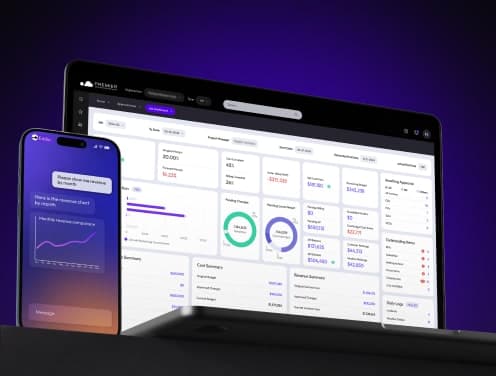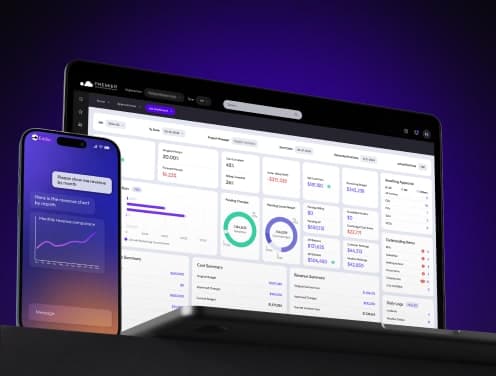
Why You Won't Grow Your Construction Business with QuickBooks: QuickBooks Alternative
The construction industry is projected to reach a market size of over $10 trillion by 2023, yet many firms struggle to scale effectively. Traditional accounting tools like QuickBooks can hold businesses back, especially when specialized features are needed. Understanding these limitations is crucial for construction companies aiming for sustainable growth.
QuickBooks lacks essential job costing features and robust payroll management designed for the unique demands of construction projects. Moreover, it falls short in revenue recognition capabilities, putting companies at risk of inaccurate financial oversight. This creates inefficiencies that can stifle profitability.
In this article, we will explore why QuickBooks might hinder your construction business. We'll compare it to dedicated construction accounting software, examine integration best practices, and outline strategies for transitioning to more robust solutions. Embracing specialized tools can propel your business to new heights.
The Limitations of QuickBooks in Construction Accounting
QuickBooks is a popular accounting tool, yet many construction companies find it lacking in key areas. A survey of over 4,000 users highlighted a strong demand for better job costing, project management, and equipment management features. QuickBooks' pricing starts at $70 per month, making it a financial consideration for firms. Despite being user-friendly for smaller companies, it doesn't fully meet the needs of larger construction businesses needing robust tools.
Lack of Job Costing Features
Job costing is critical in construction accounting, helping businesses track actual costs and revenues against budgets. QuickBooks has received criticism from users who find its job costing capabilities insufficient. Many companies seek alternatives offering better functionality, allowing insights into project cash flow and completion status. QuickBooks Projects, which includes job costing, is only available on specific versions, limiting its applicability for many construction firms.
Insufficient Revenue Recognition Capabilities
Construction companies typically use accrual accounting to recognize revenue over a contract's life, complicating financial reporting. Efficient revenue recognition demands detailed project tracking and billing, challenging for QuickBooks due to its limitations. Poor revenue recognition can affect a company's ability to gauge financial health and project profitability. As construction projects evolve, accurate revenue recognition is critical for maintaining financial integrity.
Inadequate Payroll Management for Construction
Payroll management is complex for construction firms due to varied pay rates and labor regulations. A strong payroll module can handle these complexities, ensuring accurate wage payments across different locations and projects. QuickBooks struggles with multi-state payroll processing, and may not support certified payroll reporting or EEO compliance reports necessary for bidding on government jobs. Construction companies require solutions that manage payroll intricacies effectively.
Key Requirements for Effective Construction Accounting:
- Comprehensive job costing functions
- Advanced revenue recognition capabilities
- Robust payroll management tools
- Multi-state and locality payroll processing
- Certified payroll and EEO compliance reporting
For construction firms seeking a QuickBooks alternative, looking into specialized software with these features can prove beneficial for managing complex project needs.
Comparing QuickBooks to Dedicated Construction Accounting Software
QuickBooks is often favored by smaller construction companies due to its affordability and ease of use. However, it may lack the depth needed for larger businesses requiring more advanced features and robust reporting tools. Premier stands out as a more suitable choice for larger construction firms. It offers extensive functionality, catering to complex accounting and management needs.
Benefits of Specialized Software
Specialized construction accounting software offers comprehensive tools for job costing. This allows businesses to track labor, equipment, materials, and subcontractor costs accurately. Real-time financial monitoring is another significant advantage, helping project managers keep projects within budget.
- Integrates project costs with general ledger for detailed financial insights.
- Offers construction-specific features like payroll management and customizable invoicing.
- Streamlines accounting processes, eliminating manual entry inefficiencies.
Overview of Alternatives like Premier Construction Software
Premier is tailored for small to large-size construction firms, providing an all-encompassing platform for project management and accounting. Its features include job costing, budgeting, scheduling, and payroll management, making it ideal for contractors seeking more than basic accounting.
- Pricing starts at $250/month, making it an economical upgrade from general accounting software.
- Includes modules for estimating, project management, and service operations.
- Offers strong customer support, though the software may have a steeper learning curve compared to QuickBooks.
Premier presents a competitive alternative to QuickBooks in construction, suitable for companies aiming for enhanced project management and financial oversight.
Integrating Accounting Software with Project Management Tools
Accounting and project management integration is crucial for construction businesses. Combining these tools enhances project invoicing, cost tracking, and budget reporting. This integration allows construction companies to streamline financial management across projects effectively. Construction accounting software, with its job costing functionality, aligns project costs with overall financial records seamlessly. This feature helps generate comprehensive reports on costs and revenues for specific jobs.
Some project management tools include accounting modules, offering a seamless experience by reducing the reliance on separate systems. For instance, Premier integrates financial processes like A/P invoices with lien waivers, demonstrating the importance of connected workflows within projects.
Importance of Seamless Integration
Seamless integration is vital for construction accounting software to function efficiently with existing project management and CRM systems. This capability prevents repetitive data entry, enhancing operational efficiency and productivity. Effective integration facilitates accurate job costing, revenue recognition, and payroll management. Failing to integrate well can lead to synchronization issues, potential errors, and delays. Integration allows real-time financial performance monitoring, crucial for budget maintenance and project profitability assessments.
Best Practices for Integration
Choosing construction-specific accounting software is essential since generic tools lack the necessary features for the industry's complexities. Ensure selected software integrates seamlessly with CRM and project management systems to build a cohesive technology stack. This integration saves time, reduces errors, and increases profitability. Providers offering training and ongoing support facilitate the implementation process, a critical factor for businesses. Many subcontractors enhance their ERP or accounting software with additional tools to streamline billing and improve integration with existing systems.
Key Integration Steps:
- Select industry-specific software to handle unique construction accounting needs.
- Ensure compatibility with current CRM and project management tools.
- Look for software that offers implementation support and training.
- Consider additional tools to complement and enhance existing systems.
These practices ensure a fully integrated solution that optimizes operations and financial health for construction companies.
The Distinction Between General and Construction Accounting
Construction accounting differs greatly from general accounting due to the project-based nature of the work. Unlike other industries, construction involves jobs that vary significantly in size, materials, and costs. Each project demands tailored financial data to ensure profitability. Standard accounting software often lacks the specific tools required for the varied needs of construction projects.
To handle these complexities, construction managers must use industry-specific accounting solutions. These tools account for unique cost and revenue structures associated with each project. General financial tools don't typically include features like contract management or project-specific reports, making construction accounting software essential.
Understanding Construction Accounting Needs
Choosing the right software depends on factors like company size, the capabilities of the accounting team, and the types of projects. Construction-focused solutions include essential features such as bid generation and field service management, often missing in general platforms like QuickBooks. Key functionalities to look for include job costing, revenue recognition, retainage, and payroll.
User-friendly design and efficient interfaces are crucial. Complicated software can waste staff time and resources. Seamless integration with project management and CRM systems is also a vital feature for comprehensive financial oversight and streamlined operations.
Specific Features Required in Construction Accounting
Construction accounting software offers features like project accounting, job costing, and progress billing. These tools help track expenses, manage revenue, and handle payroll effectively. Real-time tracking of materials and labor costs is also integral.
Ease of implementation and usability is key, along with reliable customer support. Companies should consider their size, project volume, and project types to compile a list of necessary features. Integration with systems like CRM and project management software ensures streamlined data management.
The Impact of Software Limitations on Business Growth
Many growing construction companies find QuickBooks inadequate as they scale. QuickBooks's user limits and limited features often hinder business scalability. As companies grow, affordability becomes critical, with rising prices affecting long-term viability. General accounting software lacks crucial capabilities for the construction industry, resulting in inefficiencies.
Specialized software is essential to handle unique industry needs like job costing and payroll management. Opting for scalable mid-range ERP solutions, instead of basic options like QuickBooks, facilitates better adaptation to evolving business needs. This support is crucial for sustaining long-term growth.
How Inefficient Accounting Affects Profitability
Inefficient accounting methods, such as manual bookkeeping, can hinder competitiveness by consuming valuable time. Poor tracking of labor, equipment, and material costs leads to budget overruns and impacts financial health. The complexity of construction payroll, with varying wage standards, risks inaccurate financial reporting and compliance issues.
Failure to account for retainage can disrupt cash flow, affecting profit margins. Using inadequate construction accounting software may lead to integration problems and repetitive data entry. This mismanagement wastes resources, detracting from profitability and efficiency.
The Risks of Inaccurate Financial Oversight
Inaccurate financial oversight often results in cost overruns, leaving construction companies unaware of their financial situation until project completion. This can diminish profits significantly. The complexities of different wage standards and labor conditions increase payroll inaccuracies.
Without real-time expense tracking, firms can face financial surprises post-project, impacting cash flow and profits. Many general accounting solutions lack the essentials for construction companies, increasing oversight errors. Manual accounting methods can lead to competitive disadvantage due to time-consuming tasks and reporting inaccuracies.
Strategies for Transitioning to Robust Solutions
Transitioning to comprehensive construction accounting solutions like Premier can greatly enhance the coordination between construction project teams and accounting departments. These software packages synchronize critical project information, improving efficiency and decision-making abilities. However, implementing robust solutions involves upfront costs that can reach thousands yearly, especially with high-end options like Premier. This pricing structure may not be suitable for smaller companies. Therefore, construction businesses should assess their needs and operational complexities before making a decision. Software like Premier is ideal for companies managing multiple projects across various jurisdictions, thanks to its excellent training support system.
Assessing Your Current Software Needs
Begin by understanding the specific requirements of your construction business. This includes company size, accounting team structure, and the number of projects undertaken annually. Consider the types of projects and average contract value to ensure software alignment with operational demands. Prioritize industry-specific software, as general financial tools often lack necessary construction accounting features. Also, consider the ease of implementation and usability, as complicated software can hinder productivity. Lastly, check integration capabilities with other systems, such as CRM and project management tools, when compiling your software must-haves.
Steps to Implement New Accounting Software
- Identify Needs: Determine if general software like QuickBooks suffices or if specialized construction accounting software is necessary based on your business's size and scope.
- Feature Evaluation: Ensure the software supports critical functions like project accounting, job costing, and progress billing for tracking expenses and managing payroll.
- Cloud Hosting: Check for cloud hosting options to allow access to accounting data from various locations, such as job sites or home offices.
- Pricing Plans: Compare pricing plans and subscription options, considering initial discounts that might lower first-year costs substantially.
- Payroll Integration: Consider integrating payroll solutions with your accounting software for streamlined operations, noting any additional costs for add-ons.
By following these structured steps, construction companies can smoothly transition to a more robust, efficient, and comprehensive accounting system.
Conclusion: Embracing Change for Sustainable Growth
Embracing new technologies and software is essential for sustainable growth in the construction industry. Robust accounting solutions drastically improve payroll management, especially given the complexities of varying pay rates and labor regulations. As the demand for specialized software grows, construction businesses must adapt to alternatives that offer enhanced functionalities.
Adoption of construction management systems like Premier, which has gained traction with over 800 contractors for its specialized module, illustrates the shift toward tailored solutions. While free construction accounting tools might serve small businesses, larger companies require scalable options to support their growth.
Here's what construction businesses should consider:
- Job costing and project management features for better operational control.
- Scalable solutions that grow with business needs.
- Advanced financial and equipment management capabilities.
By aligning tools with the evolving demands of the construction industry, businesses can ensure efficient workflows and sustainable growth. Staying updated with technology isn't just a trend: it's a necessity for maintaining competitiveness and ensuring financial health in a dynamic market.





















